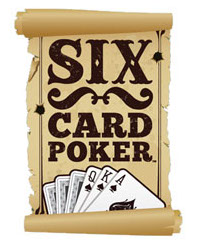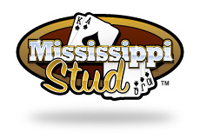Six Card Poker Bad Beat Bonus
 I end up playing a lot of this game at my local Viejas Casino, mostly because it’s a really cheap game if you stick to the just Ante bet (~1.5% house edge). Of course, everyone else plays the Aces Up and Two-Way Bad Beat Bonuses, and you pretty much get ostracised from the table for not betting them. The other players just shake their head at you, and g-d forbid you should lose with a bad beat without betting the bonus. I don’t know where else you’ll ever experience such negative communal disapproval. It’s about as bad when you hit your 12-15 against a dealer 6 upcard in Spanish 21 (you should). On 3rd base. Every hand.
I end up playing a lot of this game at my local Viejas Casino, mostly because it’s a really cheap game if you stick to the just Ante bet (~1.5% house edge). Of course, everyone else plays the Aces Up and Two-Way Bad Beat Bonuses, and you pretty much get ostracised from the table for not betting them. The other players just shake their head at you, and g-d forbid you should lose with a bad beat without betting the bonus. I don’t know where else you’ll ever experience such negative communal disapproval. It’s about as bad when you hit your 12-15 against a dealer 6 upcard in Spanish 21 (you should). On 3rd base. Every hand.
Anyway, everyone just loves the Two-Way Bad Beat Bonus. They don’t care what the house edge is. That’s why they’re there. They just want to hit a 35:1 or higher payout. And it happens frequently enough, especially when you play it every day. It’s the crack cocaine of bonus bets.
I saw the WOO’s numbers for the Two-Way Bad Beat were a little different than mine, but they’re pretty close. The 11.1% house edge is more than I’m usually willing to pay. I’ll bet it once or twice an hour, and consider it an occasional treat. But, unless I made a mistake, it’s not impossible for your straight flush to get beat (1 in 100 million). So you’re telling me there’s a chance …
| Beat Hand | Combinations | Probability | Payout (to-1) |
Return |
|---|---|---|---|---|
| Straight Flush | 1,967,920 | 1.0320E-08 | 10,000 | 0.000103 |
| Four-of-a-Kind | 150,323,712 | 7.8830E-07 | 5,000 | 0.003941 |
| Full House | 18,331,506,888 | 9.6130E-05 | 500 | 0.048065 |
| Flush | 57,651,601,832 | 3.0232E-04 | 200 | 0.060465 |
| Straight | 185,942,016,336 | 9.7508E-04 | 100 | 0.097508 |
| Three-of-a-Kind | 776,263,604,160 | 4.0707E-03 | 35 | 0.142475 |
| Two Pairs | 6,590,304,418,608 | 3.4559E-02 | 10 | 0.345595 |
| Pair Aces | 2,871,866,305,368 | 1.5060E-02 | 9 | 0.135540 |
| Others | 180,194,060,203,056 | 9.4494E-01 | -1 | -0.944935 |
| Total | 190,694,571,947,880 | 100% | -0.111243 |
Wild Six Card Draw Poker
While I was playing Six Card Poker at my local Viejas Casino, another player told be about the Wild Six Card Draw that he plays in Colorado. It’s a poker game with two wild Jokers in the 54-card deck, and the player gets 5 cards plus one free replacement card vs the dealer’s 6 card hand. I ran a Monte Carlo analysis to see if ideal 6-way collusion would yield any edge (you never know, the game has two Jokers after all). But even with 6-way collusion, you can’t get the house edge below 2.2%. I guess that makes sense, since it’s probably rare where you’d chose a weird draw over the more obvious discard. Anyway, it’s really easy to check these things, and you never know what you’ll find.
Super Six Baccarat
Some readers asked about a Baccarat side bet called “Super Six” which pays 15:1 for a dealer wins with a 6 total. It’s really easy to analyze the countability of any Baccarat side bet. The ideal return for this bet with a perfect (computer) count of an 8-deck shoe game with 15 cards behind the cut is only +24% of a fixed bet per shoe (2.6 bets per shoe at an average +9.2% advantage per bet). A simple unbalanced count (six => -2, seven, eight, nine => +1) and betting when the running count is +34 or higher yields only +12.2% of a fixed bet per shoe on 2.77 bets/shoe, and +4.41% edge/bet. It really doesn’t seem worth the effort, even if you had an ideal count (e.g., mobile app). You’d go crazy waiting around for less than 3 bets per shoe.
Edge Sorting Groups for Mississippi Stud
 You probably know that I’m not much into advantage play based on edge-sorting cards. That’s the realm of Phil Ivey and Eliot Jacobson. It’s a pretty cool technique, but it’s way too involved for my attention span, regardless of the payoff. However, I did watch Warren Beatty in Kaleidescope, if that counts for anything.
You probably know that I’m not much into advantage play based on edge-sorting cards. That’s the realm of Phil Ivey and Eliot Jacobson. It’s a pretty cool technique, but it’s way too involved for my attention span, regardless of the payoff. However, I did watch Warren Beatty in Kaleidescope, if that counts for anything.
Anyways, a reader who saw Eliot’s post on Edge Sorting (Jacks in) Mississippi Stud asked me if it’d be worthwhile to also sort the Queens, Kings, and Aces. That’s a pretty interesting question, since I can see how Eliot would start out with just the Jacks, as you’d know when you had a sure winner. But, maybe sorting the other “pay” cards would improve the return. You might not know exactly when you had a winner, but you’d have a good idea, and much more often.
I realised a Monte Carlo analysis would easily yield the ideal return for any selected sorting group. I modified a few lines of code, and violá, I simulated the estimated theoretical max return for the following sorted card groups in Mississippi Stud:
| Sorted Card Group | Ideal Return |
|---|---|
| Jacks | +39.7% |
| Jacks & Queens | +48.9% |
| Jacks, Queens, Kings | +59.0% |
| Jacks, Queens, Kings, Aces | +63.4% |
(I use the paytable that pays 5:1 for a straight.)
So it’s probably worthwhile to sort all the “pay” cards, unless it really complicates the practical strategy (not too likely).
While it’s easy to get the return for an ideal strategy for any sorting group, it takes time to work out a practical strategy. It’s straightforward, but tedious, so I’m not doing it. (Well, I actually did it for a reader, so it’s his now.)
4 comments